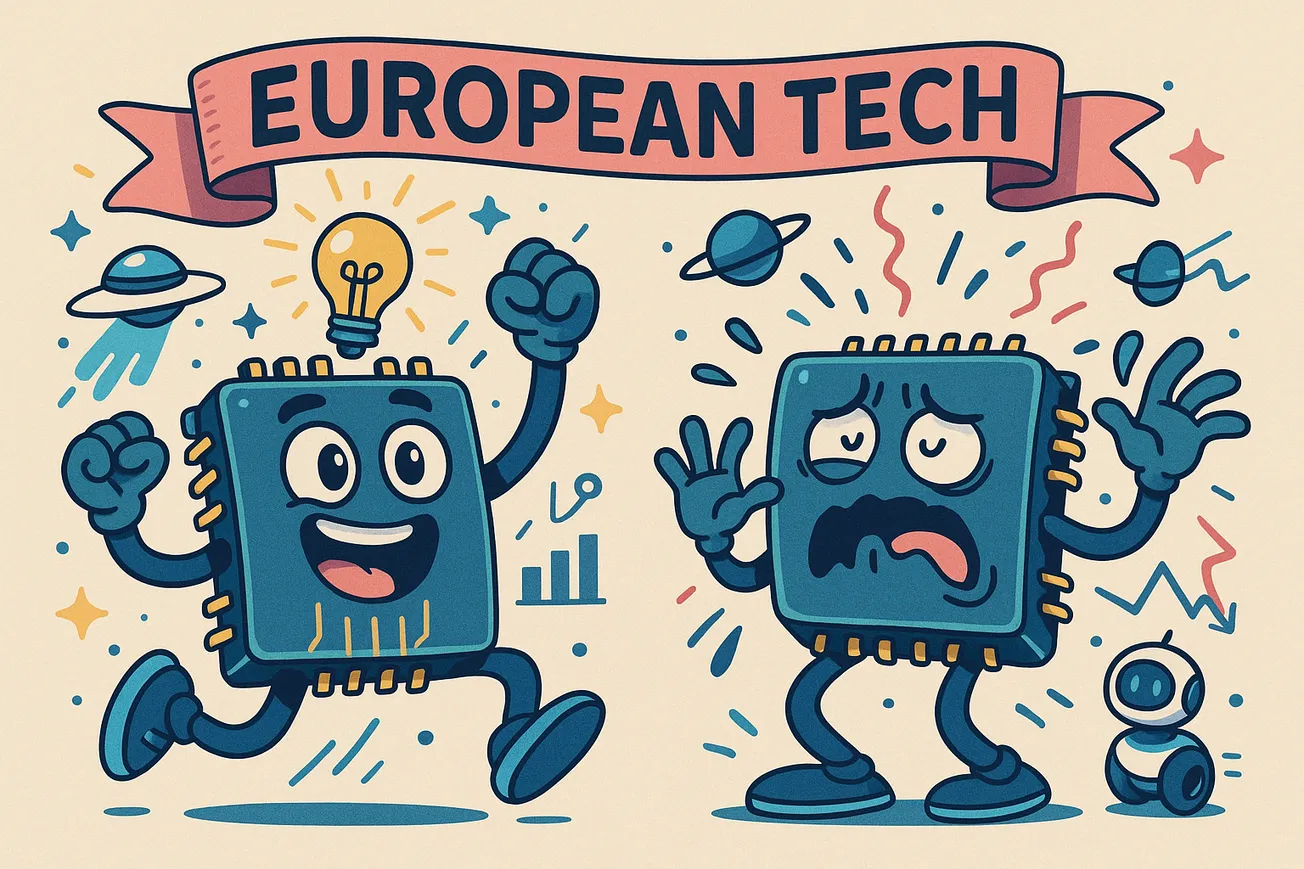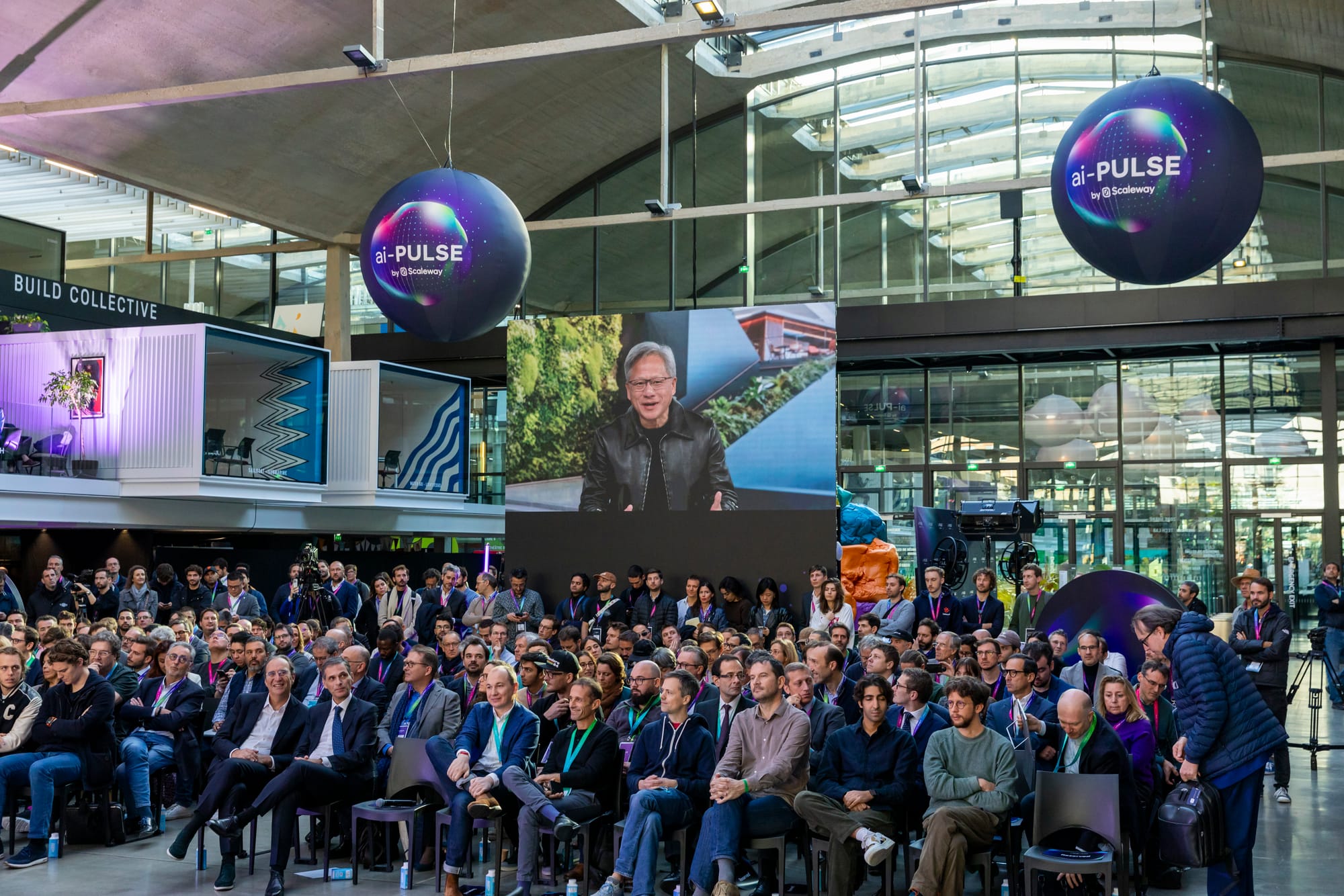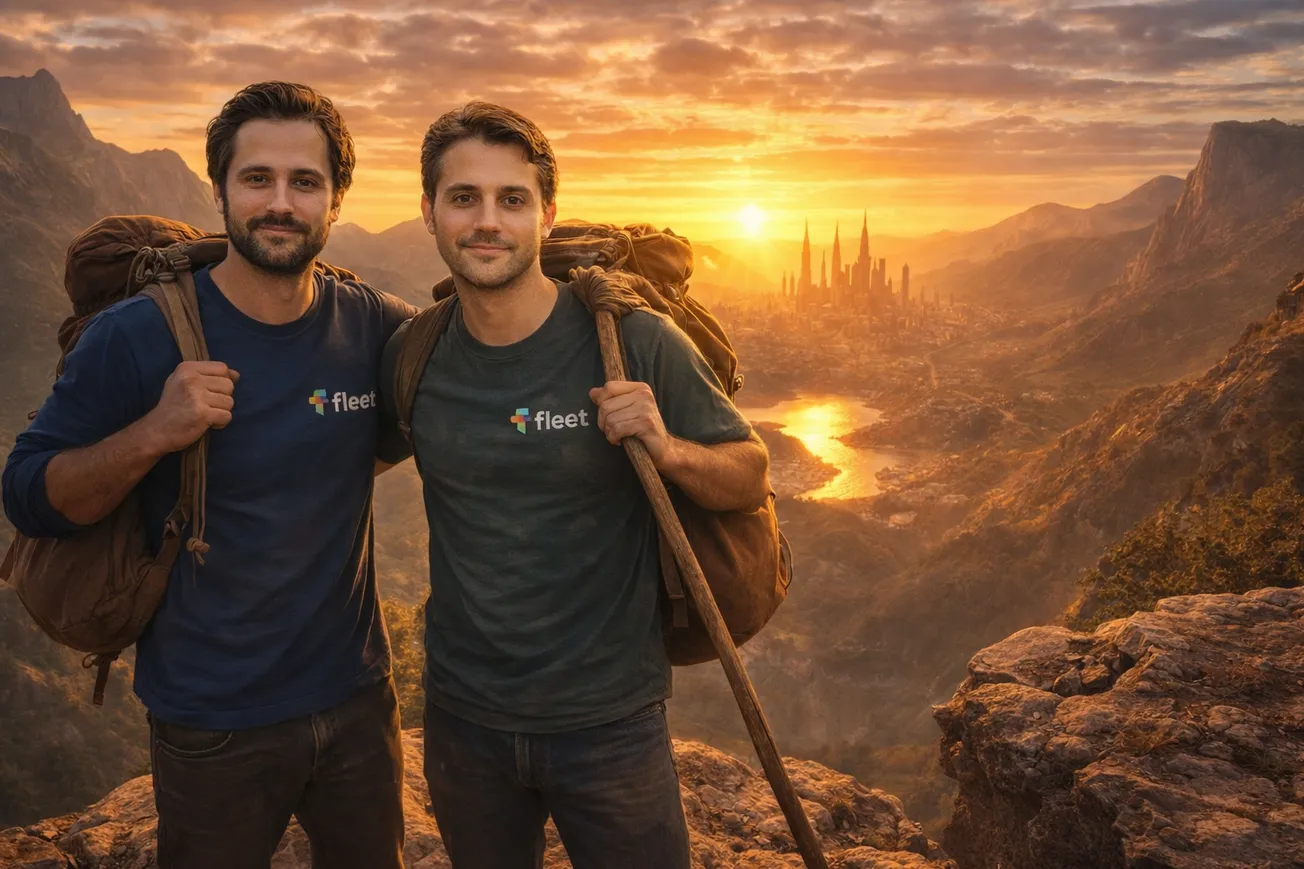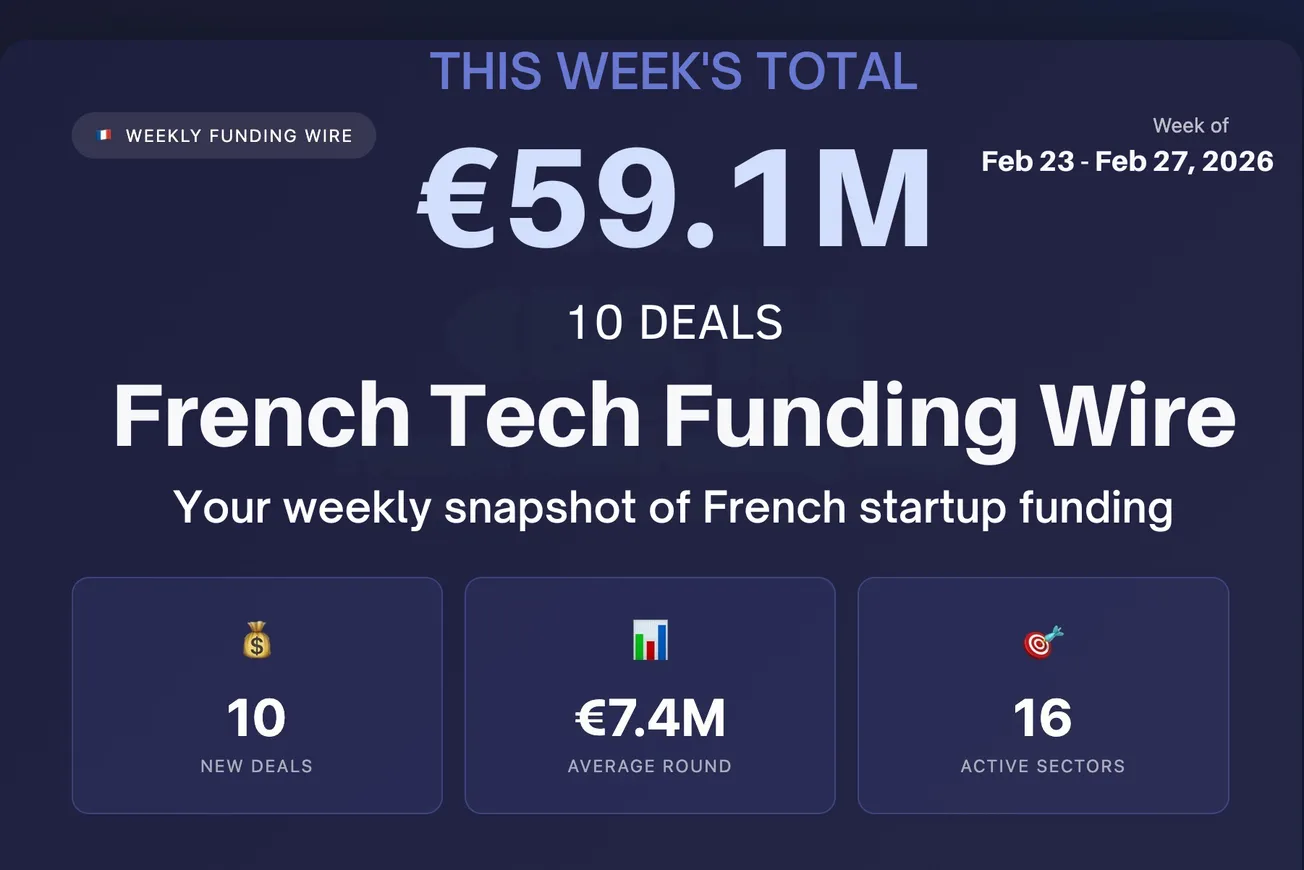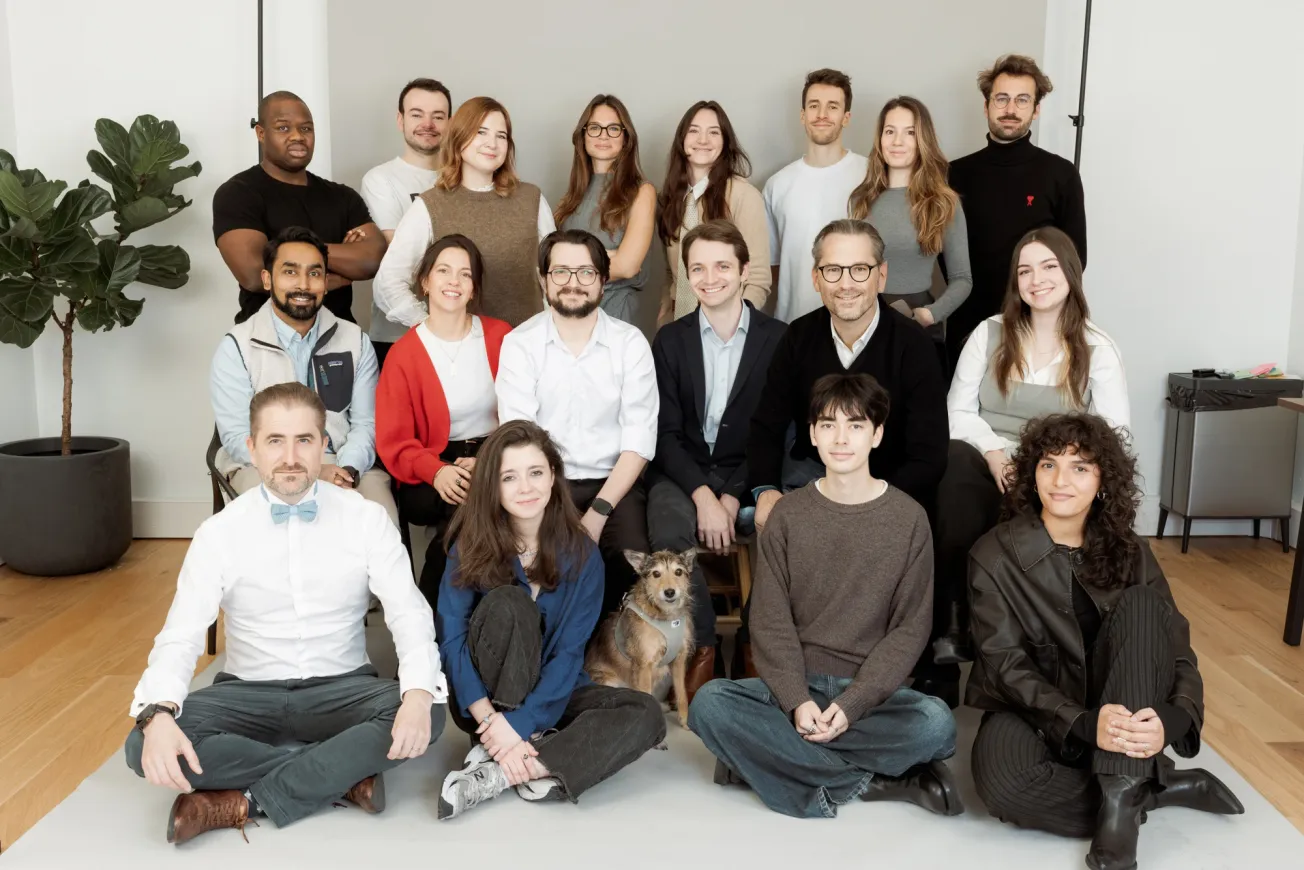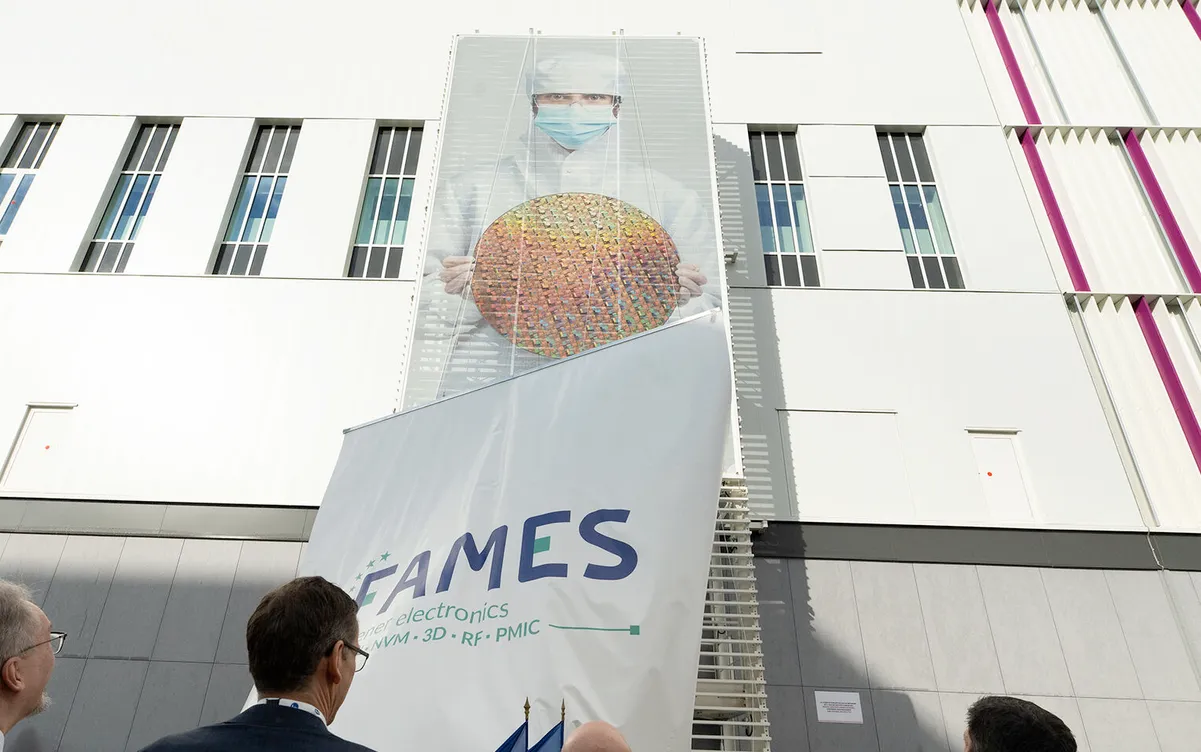Inside this week's edition:
👀 Rift raised €4.6M for its on-demand aerial surveillance network of autonomous long-endurance drones that provide governments and operators instant, low-cost “intelligence as a service” as Europe seeks faster, safer ways to monitor and protect critical territory. Co-founder and CEO Daniel Nef tells us Rift's origin story and how it hopes to become Europe's eye in the sky.
👀 Two reports, two moods: Atomico sees sunshine and a trillion-euro tech titan on the horizon. PitchBook forecasts storm clouds and a stress ball. European tech in 2025 is a sloppy mess with big dreams and a terrible hangover, but a can-do attitude if it can just stop tripping over itself. Grab your mood ring and see which way the metaphorical tech wind is blowing.
Chris O'Brien + Helen O'Reilly-Durand
ai-PULSE, Europe’s premier AI conference organized by Scaleway, is coming back to STATION F, Paris on December 4 for a unique blend of deep technical expertise and business insights.
The themes this year: Smarter, Faster, Everywhere. How is AI being integrated into everything from pharmaceutical R&D to fighter jets? Which metrics should researchers focus on when benchmarking the latest models? How can you circumvent hardware constraints to make inference 100x faster?
Across a full day of groundbreaking keynotes, technical demos, practical workshops, and networking, you'll hear about how AI leaders from Europe and beyond are driving AI forward.
Join us on December 4 either on-site or online to hear from Proton, ZML, Kyutai, Meta, NVIDIA, and dozens more pioneers in the field.
Tech Talk
✈️ 👋 Will the last French VC leaving Paris please turn out the lights? Two more notable VCs are heading to SF seeking gold in them thar AI hills. They are joining the party train of French investors and entrepreneurs flocking back to San Francisco, pronounced dead just two years ago by know-it-all tech-bros, convinced the city has regained its status as the global epicenter of tech. Especially in AI.
Frst partners Pierre Entremont and Bruno Raillard are the latest to open a local outpost, setting up shop in Jackson Square to tap into the surge of French founders now building in the Bay Area. While still based in Paris, the duo will rely on a network of on-the-ground “scouts” to spot emerging founders and stay aligned with the lightning-fast pace of the U.S. market.
Founders Future is making a similar bet: the fund has opened a San Francisco office in the iconic Ferry Building, hiring two seasoned American investors to bridge European startups aiming to scale in the U.S. and U.S. AI founders looking to expand into Europe.
Both Frst and Founders Future say the draw is obvious. American clients move faster, pay more, and offer sharper product feedback, creating a velocity gap with Europe that ambitious founders can’t ignore. At the same time, a growing wave of French entrepreneurs is relocating to California, drawn by an environment where intensity is celebrated and opportunities compound rapidly. Founders Future plans to deepen this transatlantic strategy with a new growth fund launching in 2026, aiming to deploy $5–10 million tickets and grow its assets under management from €300 million today to €1 billion by 2030. 🤑
As a former SF and Bay Area resident, here are Chris' helpful insider tips: "Wear layers. Don't call it 'Frisco. Nobody calls it 'Frisco". | Les Echos, Maddyness, LinkedIn
👨🔬🚪 Yann LeCun has officially updated his Facebook status. The AI guru confirmed previous reports that he will leave Meta at the end of the year after 12 years at the company, where he served as founding director of FAIR and later as Chief AI Scientist. LeCun revealed that he is launching a new startup dedicated to his long-running Advanced Machine Intelligence (AMI) research program, aimed at developing AI systems capable of understanding the physical world, reasoning, maintaining persistent memory, and planning complex actions. While the new venture will operate independently to maximize its broader impact across industries, Meta will remain a strategic partner, with Mark Zuckerberg and senior Meta leaders backing the initiative. LeCun described the creation of FAIR as his proudest non-technical achievement and emphasized the lab’s transformative impact on Meta, the AI field, and the broader tech community. Further details about the startup will be shared at a later date. | LinkedIn
🚀💰 Sofinnova Partners closed its flagship Sofinnova Capital XI fund at an impressive €650M ($750M), far surpassing its initial target. This new fund will back the next generation of early-stage biotech and medtech startups across Europe and the US, focusing on critical and still-unmet clinical needs. The firm said that Capital XI drew strong demand from global institutional investors such as sovereign funds and major pharma groups, with both long-standing backers and high-profile newcomers joining in. The raise brings Sofinnova’s total capital gathered over the past year to €1.5B. | Maddyness
🎂💄 Viva Technology finally bowed to the inevitable reality that everyone calls it VivaTech and changed its name to...VivaTech. Just in time for its 10th anniversary edition in 2026. The Paris tech festival is also moving into the newly renovated Pavilion 7 — the Paris Convention Centre — where it has even more space (70,000 m²) across three levels. This “new look” VivaTech will feature expanded stages, lounges for executives and founders, innovation zones, and a flagship mega-stage dubbed The Box for headline speakers. Germany will be the country of honor in 2026, reflecting deep Franco-German ties and growing collaboration on digital sovereignty. Adding to the shake-up, Maurice 'Gangster of Love' Lévy has bought back Publicis’ shares to become a 50/50 owner of this high-tech hootenany. | Maddyness
📈 🛒 AB Tasty is doubling down on predictive personalization with its acquisition of a real-time “Adaptive CX” platform that reads every visitor signal — clicks, scrolls, tab-switching — and instantly adapts the onsite experience. The US-, UK-, and Israel-based startup specializes in targeting anonymous and non-linear user journeys, processing 3.7B data points each month to predict intent in just milliseconds. For AB Tasty, this move strengthens its strategy of expanding beyond classic A/B testing, following previous acquisitions like Epoq, Dotaki, and Potions. As digital journeys grow increasingly fragmented, the combined offering promises brands a powerful way to personalize experiences for the 90% of visitors who never log in. | Maddyness
😞🥸 France may be emerging as a European powerhouse in AI research and innovation, but a new report from the Cour des comptes warns that the French state itself is lagging far behind in adopting these technologies. Despite world-class academic clusters, a booming generative AI ecosystem, and over 1,000 startups in the field, no dedicated budget was allocated between 2023 and 2025 to modernize public services with AI, despite this being a core objective of the national strategy. Early pilots in fraud detection or workflow automation often failed to scale, leaving administrations with underpowered internal tools while the private sector advanced. The report stresses that 38% of public-sector jobs will be significantly impacted by generative AI, making the state’s slow adaptation a potential operational risk rather than just a technological delay. To close the gap, the Cour calls for a new AI Secretariat reporting to the Prime Minister, a massive acceleration of adoption across ministries, and a far more proactive use of public procurement to support sovereign AI solutions. | FrenchWeb
Atomico Vs Pitchbook 2025 Street Fight: Is Europe’s Tech Glass Half Full or Empty?

Atomico’s State of European Tech 2025 sees blue skies, tailwinds, and a trillion-euro tech champion on the horizon. PitchBook’s European Venture Q3 2025 sees… clouds. Some lightning. Possibly a dragon. And definitely fewer follow-on rounds.
Before we compare them, a crucial disclaimer:
Atomico uses full-year 2025 projections based on data up to 30 September 2025 and blends quantitative data with qualitative founder & investor surveys.
PitchBook, by contrast, measures actual data up to Q3 2025 with no attempt at crystal-balling December.
So, yes. One is painting a mural. The other is reading a bank statement. Different exercises. But comparing the two is still useful (and, frankly, entertaining) because it reveals the psychological split in European tech this year: confidence vs. caution, momentum vs. math, vibes vs. valuation tables.
Let’s dig in.
Rift Takes Flight: Drone Startup Wants To Be Europe's Eyes in the Sky

When forest fires rage across southern Europe or suspicious vessels approach protected coastlines, the response to monitor the situation typically involves expensive helicopters that can cost over €3,000 per flight hour.
French startup Rift believes it has a better answer: a network of autonomous drones that can provide instant aerial surveillance anywhere, anytime, at a fraction of the cost.
The company is building what it describes as the world’s first network of long-endurance autonomous drones launched from remote stations, connected by a software platform that delivers persistent, on-demand surveillance of critical areas such as coastlines, pipelines, power lines, and borders. Rather than selling drones or software, the company sells access to this monitoring, which it dubs "intelligence as a service."
Rift's push to become Europe's aerial intelligence infrastructure got a boost this week with a €4.6 million round of funding that will help it transition from its development phase into its first operational deployments for governments and industrial partners. The timing of its development and Rift's early traction reflects a dramatic shift in Europe’s appetite for sovereign technologies as well as tech that can monitor and protect territory at a time of geopolitical instability and climate-driven disasters.
Rift was born from that convergence: technological readiness, regulatory necessity, and a growing market demand for faster, cheaper, more automated aerial intelligence.
"We want to make Rift as accessible as internet connectivity for those who protect our territory," said Rift CEO and Co-Founder Daniel Nef. "But not just for them, but also in the future, for any actor who needs to better understand their environment, where they could benefit from real-time aerial surveillance."
💸 Top Funding Deals 💸

📇 Company: Deblock
🔍 Description: A crypto-banking platform combining everyday euro accounts with on-chain, self-custody crypto wallets—enabling users to hold, pay, invest, and access DeFi services while maintaining full control of their digital assets.
💻 Website: deblock.com
📍 HQ City: Paris
🧗 Round: Series A
💰 Amount Raised: €30M
🏦 Investors: Speedinvest (lead), CommerzVentures, Latitude, 20VC, Headline, Chalfen Ventures, Kraken Ventures
👨💼👩💼 Founders: Aaron Beck, Adriana Restrepo, Jean Meyer (CEO), Mario Eguiluz
🗞️ News: Deblock raises €30M to expand its on-chain banking solution across Europe, beginning with Germany. With 300,000 clients and the first euro current account integrated with a true self-custody crypto wallet, Deblock positions itself within a fast-growing European trend toward fintech–crypto convergence. | EU Startups

📇 Company: GetVocal
🔍 Description: Paris-based conversational AI startup developing hybrid human-supervised AI voice agents for enterprise customer service, built on a proprietary “protocol automation” system that encodes business rules with mathematical precision.
💻 Website: getvocal.ai
📍 HQ City: Paris
🧗 Round: Series A
💰 Amount Raised: $26M
🏦 Investors: Creandum (lead), Elaia, Speedinvest
👨💼👩💼 Founders: Roy Moussa (CEO), Antonin Bertin (CTO)
🗞️ News: GetVocal raises $26M Series A—its second round this year—as Voice AI heats up globally, aiming to scale its hybrid human+AI conversational agents, already deployed across 23 markets with customers including Vodafone, Movistar, and Glovo. The company’s architecture blends LLM capabilities with graph-based business protocols and real-time human supervision to deliver reliable enterprise automation and improve agent performance over time. | The French Tech Journal

📇 Company: HyPrSpace
🔍 Description: French DeepTech startup developing Orbital Baguette 1 (OB-1), a hybrid-propulsion microlauncher capable of placing 250 kg into orbit. The company combines liquid oxygen with a recyclable polyethylene-based solid fuel to deliver a simpler, safer, high-performance propulsion system.
💻 Website: HyPrSpace
📍 HQ City: Bordeaux
🧗 Round: Series A
💰 Amount Raised: €21M
🏦 Investors: Red River West, DeepTech 2030 (Bpifrance / France 2030), Expansion, NACO
👨💼👩💼 Founders: Alexandre Mangeot, Sylvain Bataillard, Vincent Rocher
🗞️ News: HyPrSpace raises €21M to finalize its hybrid engine, advance toward a first suborbital flight in 2026, and prepare industrial-scale production of its OB-1 microlauncher as Europe’s small-satellite launch segment accelerates. | Maddyness
👋🏻 If you’re enjoying The French Tech Journal, support the project by forwarding it to friends and sharing it on your social networks. You can also comment on this post. And if you have ideas for stories, tips, or just want to harass us, shoot us an email: [email protected] / [email protected] 👋🏻

